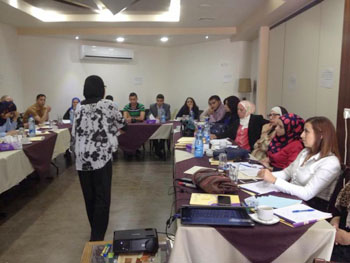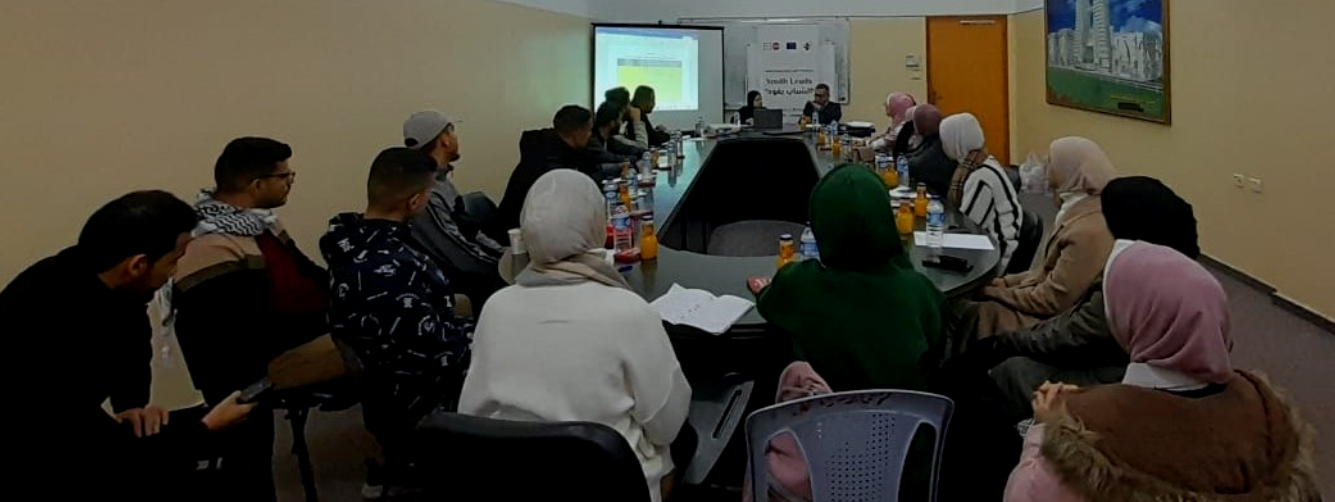
Ramallah – A group of women community leaders, including young leaders, wrapped up a three-day training course last week as part of its program towards ‘Institutionalizing UNSC 1325 to achieve peace and security for Palestinian women”, which MIFTAH implements with support from OXFAM-Novib.
The training workshop was aimed at enhancing the role of women community leaders in reviving international resolutions with a focus on Security Council 1325, which enables women to demand that the Security Council and Secretary General provide protection for Palestinian women against human rights violations perpetrated by the Israeli occupation.
The three-day workshop was given by Maysoon Qawasmi, Fida’ Barghouti and Lamya Shalaldeh, and offered the women information about monitoring and documenting violations against women in Palestine perpetrated by the Israeli occupation in accordance with Resolution 1325. The trainers introduced them to the legal paths they could take for each violation and showed them how to write up reports and conduct interviews with women.
Jerusalem women activist Amal Al Qassem said the workshop gave her a deeper understanding of Resolution 1325, which she said was particularly significant to her city. “Jerusalem is still under occupation and Israeli forces there carry out terrible violations against women, especially in Sheikh Jarrah where they are being forced out,” Qassem says. This, she adds, means they are deprived of security and safety, not to mention being deprived of their right to a home and freedom to movement because of the separation wall. Qassem went on to say the workshop helped her understand how Resolution 1325 is a type of guarantee for women’s participation in peace efforts and a guarantee for their protection during war and conflict. It also shed light on its specific significance to Palestinian women because of how it overlaps with the requirements of the Palestinian women’s movement in its demand for national liberation and a just and comprehensive peace, coupled with the need for social advancement and democratic values.
While she realizes her hope is far-fetched, Qassem says Resolution 1325 could be the catalyst for demanding protection for Palestinian women from the UN including Jerusalemites especially regarding their forced expulsion from places like Sheikh Jarrah and Silwan. “We could also demand that a fact-finding commission is sent to see why this resolution is not implemented in occupied Jerusalem,” she says, adding that she is already drawing up an action plan to hold workshops and lectures in the coming months focused on the importance of Resolution 1325. She wants to encourage women in Jerusalem to participate more in documenting violations, filing complaints and building cases that could be used to hold the Israeli occupation accountable for their actions.
Another activist, Sundus Ali, who is a correspondent for Al Ayyam newspaper in Tulkarm says she also learned a lot more about Resolution 1325 from the workshop, especially in terms of the documentation of violations against Palestinian women and linking these violations with 1325.
Amina Aslan from the Women’s Studies Center in Nablus and member of the Resolution 1325 coalition says: “This is the first time a methodology on equality and reaching social justice has ever been proposed.” She said the training gave the women strength to shift their knowledge about the resolution from the level of rights to the level of active participation. “This means we will be able to benefit from what we learned in confronting Israeli attacks on us as women living near settlements; our lands are under constant threat of confiscation and our homes are demolished. And let’s not forget about the prisoners.”
Freed prisoner and women’s activist Myasar Atyani also said she greatly benefited from learning how to formulate plans for support and advocacy campaigns from the workshop. One male participant named Waseem was impressed with the trainers, saying they were able to integrate Resolution 1325 at the national level whereby any documentation of violations would be based on the resolution.







